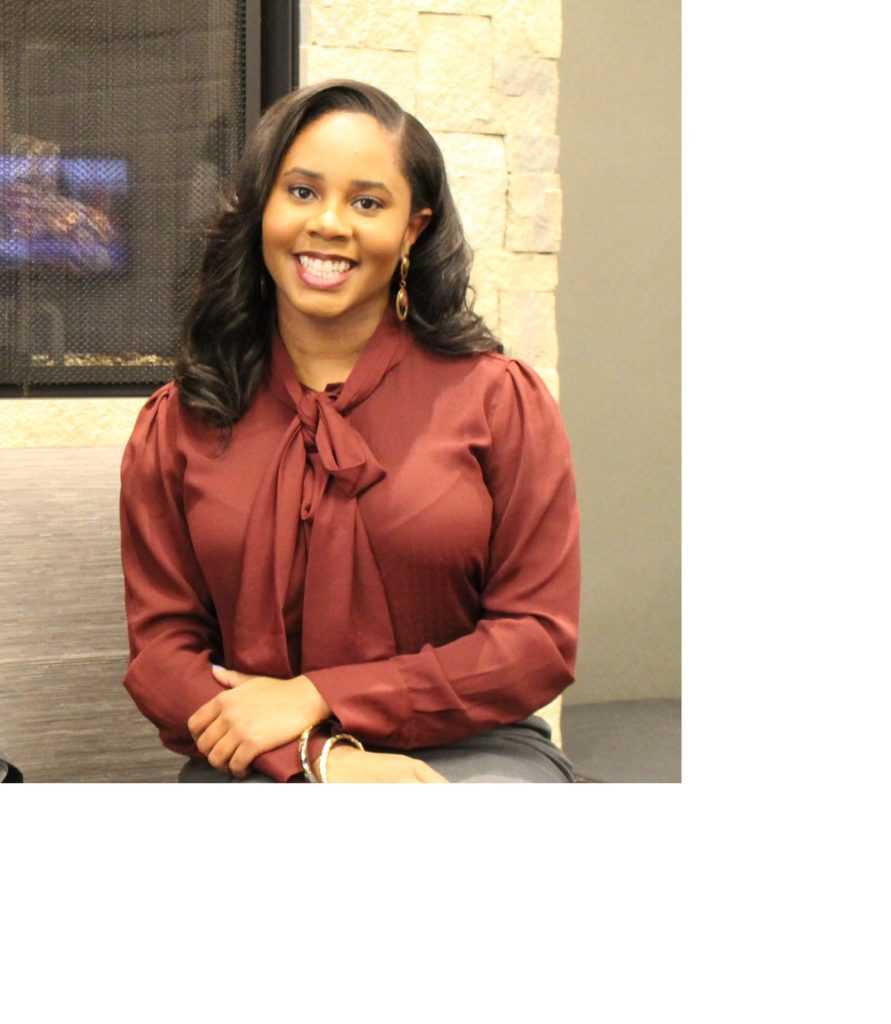
This month we begin a new series about attorneys who inspire us, both as representatives of their profession and as exceptional human beings. Kristen D. Hardy, Counsel – Global Compliance at Briggs & Stratton Corporation, and Clyde Tinnen, Partner at Foley & Lardner LLP, graciously agreed to help us kick this idea off. Our gratitude to you both! Watch for our conversation with Clyde to appear here next month.
Detroit native Kristen Hardy has been engaged with the Milwaukee community since she arrived to earn her degree at Marquette University Law School. She currently serves on the boards of the Milwaukee Bar Association, LOTUS Legal Clinic and the Milwaukee Debate League, and is the Immediate Past-President of the Wisconsin Association of African-American Lawyers (WAAL). Kristen was recognized twice in 2019 by The Milwaukee Business Journal as a 40 Under 40, and also as Top Corporate Counsel: Rising Star.
Q: You were raised in Detroit and spent your undergrad days in New Jersey at Seton Hall. What led to you make Milwaukee your home after MU?
Kristen – I’m Midwest born and bred, and Milwaukee reminds me a lot of home. When I came here for law school I intended to stay, at least for a time, and I’ve continued to grow fonder of the city. It’s a great food town, people are “Midwest nice” which I like, and the city is full of good people who want to effectuate change. They want to make a positive impact. It’s not hard to meet those people and be around them, and they naturally force you to step it up. I have a circle of friends and professional associates that are all passionate about trying to make a change on multiple fronts. That’s my favorite thing about the city – being around people who are really positive and really want to make a change for the better.
Q: As a young woman of color in the legal profession, what biases have you faced, and how have you overcome them?
Kristen – I’ve been fortunate enough to work for good companies and have all kinds of great people wrap their arms around me to mentor and support me. So it’s hard to pinpoint exact instances of bias, but the statistics for people who look like me in the legal profession are enough to prove that it exists at some level. I know that I alone can’t combat bias that people may hold against me. I can’t singlehandedly change the mind of someone that is unwillingly or disinterested in changing, and I don’t think that’s necessarily for me to do. But what I can do is focus on building relationships with those who are willing and open to listening. An attorney told me years ago that we can change some of the disparities in the profession just by building better relationships with people who are different than us. At the time this seemed too simplistic, because I’m thinking, if you don’t really care and you don’t want to change how the profession looks, relationship building cannot magically open your eyes to it. But now that I’m a bit older, I have more of an appreciation for the intent behind his words.
When you get to know someone, you start to realize that although we look different and we have different backgrounds, we can almost always find common ground, whatever that may be. When you learn more about people, you begin to see some of the bias and discrimination they face from their perspective. It’s easier to empathize with someone you identify with for one reason or another, despite your differences. And hopefully, this newfound understanding and empathy helps others see the very real issues that underrepresented groups face, and in turn, inspires everyone to do their part to dismantle unfair systems. So I alone can’t overcome bias or prejudice that others hold against me, but I can form relationships and be open to providing information, listening, learning, and checking any bias that I may hold in the process.
Q: What’s been important for you in carving your path to success?
Kristen – Athletics and how I was raised. I ran track in college and played a lot of sports growing up, so I’ve always been told that I’m very coachable. I’m open to listening to what others have to say and taking direction when needed, but also good about trusting my instincts when necessary. I came into law school and the profession with an open mind, and I believe having that attitude has paved the way for opportunities that have helped me be successful.
Q: When you’re not thinking about work and life responsibilities, what’s on your mind?
Kristen – At home and outside of work or professional groups, I’m often thinking about what I’m going to cook and what I’m going to eat because I’m a huge foodie. I’ve recently been trying my hand at making more healthy meals. But I love going to new restaurants in the city, so much so that it’s rare for people tell me about a restaurant that isn’t already on my radar. If they do, I’ll add it to my little “Places I Haven’t Been Yet” list that I maintain on Yelp. I also try to make time to get back home to Detroit to visit my grandparents and my mom and dad, as well as get out to D.C. to visit my little brother. Getting back to family is really important to me because their love is unconditional and they always keep you grounded and humble.
I also love traveling and I try to take an international trip at least once a year. I like to visit local places, find the best food, and connect with the local people. Even when there’s a language barrier, there is still a human connection that allows you to laugh and have a good time.
Q: What do you want to be known for as a person?
Kristen – There’s a Toni Morrison quote that I’ve thought about a lot since she passed away last year. I heard it many moons ago and it has continued to resonate with me: “If you’re free, you need to free somebody else. If you have power, then your job is to empower somebody else.”
In many ways, this quote goes to the heart of my upbringing. I want to be remembered for empowering others in an impactful way. Even if I can’t do something directly, I think about how I can help others accomplish their goals. I might not have all the money, power, or resources to create specific opportunities, but what can I do to ensure equal opportunity and access? The world is large and I believe our lives are more purposeful than what we do for ourselves or those in our immediate circles. So how are we going to help make our world a better place? And not just for us, but also for our descendants.
That’s what I want to be known for – as a person who wanted to meaningfully contribute to society in a way that positively impacts others well after I leave this earth. This is what I work towards every day.
Stay tuned for our next conversation with Foley & Lardner Partner Clyde Tinnen.




